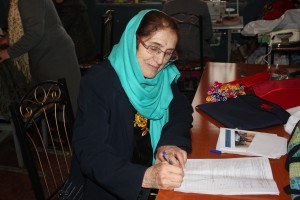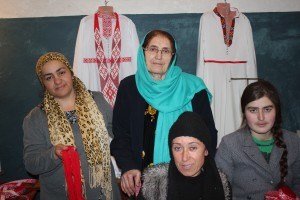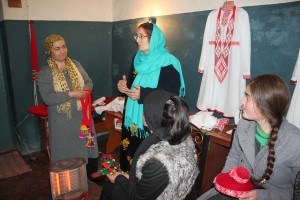Tursunmo Khudododova, 74, from Khorog, Tajikistan is an active women’s leader in her community. She has organized many women-focused Civil Society Organizations (CSOs), committed to improving women’s financial circumstances, with the support of the Mountain Societies Development Support Programme (MSDSP), a project of the Aga Khan Foundation (AKF).
Tursunmo has lived almost her entire life in Khorog. She raised four children and now has five grandchildren living in Dushanbe and Moscow. She had a full career during the Soviet era, leading the government’s agricultural planning department for 22 years and then working as head of the department for social insurance for 8 years before she retired.
During the hard times after the breakup of the Soviet Union, resulting in civil war and famine, Tursunmo retired from her job and got involved with the Aga Khan Foundation’s work. “My main motivation was that I have always been among people, working with people and for people. Therefore, it was a natural continuation for me to become involved with my community,” says Tursunmo.
When the Mountain Societies Development Support Programme launched the Village Organizations program in 2001, Tursunmo was selected as the head of the women’s group in her Village Organization. Back then, women were particularly at risk during the economic crisis, which followed the civil war. As Tursunmo recalls, AKF’s Mountain Societies Development Support Programme was trying to look for ways to improve the lives of women in the community.
Tursunmo during her visit to her women’s organization called “Adolat”
Overcoming Challenges
In establishing community savings groups, Tursunmo’s main contribution was working “seriously” with her groups and, despite many challenges, she was able to manage the groups to maturity.
Tursunmo faced big challenges in the beginning. People were completely unfamiliar with the concept of community savings and were unwilling to join the groups. “When we started a women’s group with 20 women, others were curious about what we were doing and how we did it. We worked hard to familiarize women about the benefits of savings. Now we’ve increased ninefold,” says Tursunmo. This success owes much to Tursunmo’s contribution. She has motivated other women with her own example, attracting women to join savings groups.
One main challenge was the lack of entrepreneurial mindset among people, especially women. To address this issue, active women like Tursunmo facilitated and participated in the numerous trainings for women on how to launch small-scale businesses.
Progress Takes Hold
Since 2008 Tursunmo has worked as the head of a public association covering half of Khorog, which oversees eight mahalla (or neighborhood) committees and other community-based CSOs. She has organized 77 Community-based Saving Groups (CBSGs), involving 2,730 women, and she continues to establish and supervise CBSGs on a voluntary basis. She also established 12 small-scale community-owned businesses, creating 40 jobs for women. (Read more about how CBSGs in Tajikistan support women here.)
The Impact of Community Savings Groups
Tursunmo explains that the Community-based Saving Groups have helped women grow their financial skills. “We tried poultry raising and beekeeping, but these activities proved to be unsustainable. Women, young and old, have learned how to save, manage a family budget, and obtain and repay loans when they need them. But more importantly a change in attitude has happened. Taking loans is no longer deemed ‘shameful,’ but something necessary and important for establishing businesses and improving livelihoods.”
For example, three determined women decided to use a loan from their CBSG to open a tailoring shop. As their business flourished, they hired four more women, and trained them in sewing traditional and modern clothes. Then they moved their shop downtown, closer to the market.
Tursunmo and the three CBSG entrepreneurs
The reason these enterprises are more sustainable than beekeeping or poultry raising, Tursunmo explains, “is because the idea was not ‘imposed’ from the top, but came from their experience. The best business ideas have come directly from the women and involved what the women are good at and passionate about. I think this is the key factor that proved these practices are more sustainable.”
One of Tursunmo’s favorite examples of what CBSGs can do for women was a group where all five members had disabilities and came from very poor households. The group focused on job placement and income. “Among them were two girls in their twenties, whose parents died, both with disabilities. They refused to go out of their house to get a job. Their financial situation was dire before joining the group. It was a major success when, over time, the young women managed to save up money and join a business. But an even greater achievement was that they started to come out of their house more and socialize with people. Now they make national embroidery caps (toqi) and sell them in the local market. They have both significantly improved their financial situation and found permanent jobs. This example is my favorite, since I see the impact of the CBSGs activities vividly.”
Tursonmo facilitating CBSG members
Motivated by Service to Community
“There are always higher aims and greater pleasures in life than just money,” said Tursunmo. Service to community and to the Imam are the main motivations she identifies. For this cause, it is important for her to offer her time and knowledge voluntarily. “To me this is the only meaningful way I can contribute to the development of my own community. This is my way of paying back the community and the Imam,” she added.
Educated and Independent Women: A Strong Force for Development
For someone who lived through the Soviet period and the emergence of an independent Tajikistan, her perspective on the opportunities and challenges women face in two different eras is priceless. When she was a young woman, women had greater social and career protections than they have today. After the collapse of Soviet Union, the deep social and economic crisis had a devastating effect on the lives and opportunities for women. Women were very active during and after the 1980s policy reform period of perestroika (meaning “openness”) and they proudly shared the burden of the subsequent crisis alongside men.
“Today women are much more burdened to make a living than they were back then. Today women are more active in providing for their families, making savings, and educating their children,” Tursunmo explains. “Yet at the same time, they have more options for growth than ever before. I think in our contemporary times, women have more opportunities, such as establishing their own businesses and fulfilling their dreams, rather than following the ‘pre-destined’ route established for them by others.”
Opportunities remain limited, especially for women, in the Pamirs with the overall high unemployment rate in the country. Nevertheless, Tursunmo has high hopes: “I would be very enthusiastic to see more women join CBSGs or women’s groups that help unfold their potential and give them more financial independence. This is one of the best ways for developing the community and the country, because educated and independent women are a strong development force.”


